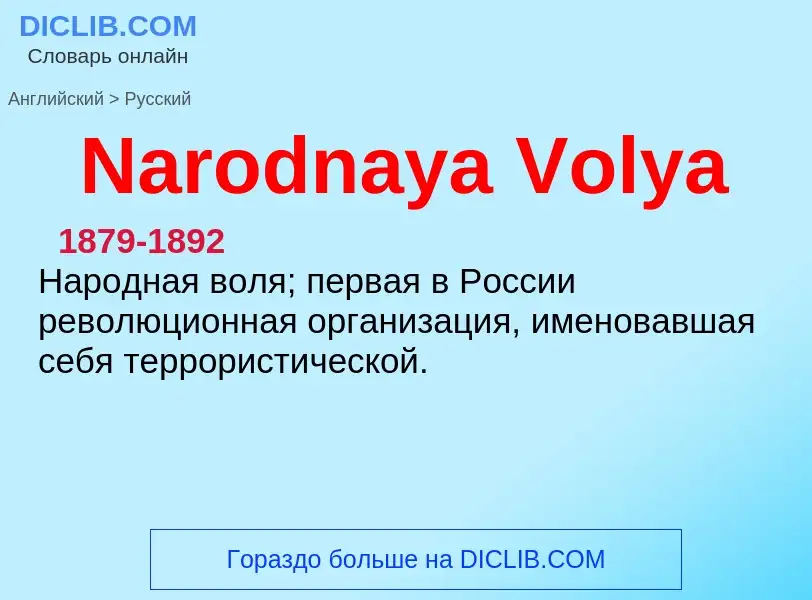Μετάφραση και ανάλυση λέξεων από την τεχνητή νοημοσύνη ChatGPT
Σε αυτήν τη σελίδα μπορείτε να λάβετε μια λεπτομερή ανάλυση μιας λέξης ή μιας φράσης, η οποία δημιουργήθηκε χρησιμοποιώντας το ChatGPT, την καλύτερη τεχνολογία τεχνητής νοημοσύνης μέχρι σήμερα:
- πώς χρησιμοποιείται η λέξη
- συχνότητα χρήσης
- χρησιμοποιείται πιο συχνά στον προφορικό ή γραπτό λόγο
- επιλογές μετάφρασης λέξεων
- παραδείγματα χρήσης (πολλές φράσεις με μετάφραση)
- ετυμολογία
Narodnaya Volya - translation to ρωσικά
Βικιπαίδεια
Narodnaya Volya (Russian: Наро́дная во́ля, IPA: [nɐˈrodnəjə ˈvolʲə], lit. 'People's Will') was a late 19th-century revolutionary socialist political organization and left-wing terrorist group operating in the Russian Empire, which conducted assassinations of government officials in an attempt to overthrow the autocratic Tsarist system. The organization declared itself to be a populist movement that succeeded the Narodniks. Composed primarily of young revolutionary socialist intellectuals believing in the efficacy of terrorism, Narodnaya Volya emerged in Autumn 1879 from the split of an earlier revolutionary organization called Zemlya i Volya ("Land and Liberty").
Based upon an underground apparatus of local, semi-independent cells co-ordinated by a self-selecting Executive Committee, Narodnaya Volya continued to espouse acts of political violence in an attempt to spur mass revolt against Tsarism, culminating in the successful assassination of Tsar Alexander II in March 1881—the event for which the group is best remembered.
It favored the use of secret society terrorism as an attempt to violently destabilize the Russian Empire and provide a focus for popular discontent against it for an insurrection, justified "as a means of exerting pressure on the government for reform, as the spark that would ignite a vast peasant uprising, and as the inevitable response to the regime's use of violence against the revolutionaries". The group developed ideas—such as assassination of the "leaders of oppression"—that were to become the hallmark of subsequent violence by small non-state groups, and they were convinced that the developing technologies of the age—such as the invention of dynamite—enabled them to strike directly and with discrimination.
Much of the organization's philosophy was inspired by Sergey Nechayev and "propaganda by the deed"–proponent Carlo Pisacane. The group served as inspiration and forerunner for other revolutionary socialist and anarchist organizations that followed, including in particular the Russian Socialist Revolutionary Party (PSR). Although they were socialist and often get associated with Marxism, they fought against it often.

![[[Alexander Dmitrievich Mikhailov]] (1855–1884), was one of the founders of ''Zemlya i Volya'', predecessor of ''Narodnaya Volya''. [[Alexander Dmitrievich Mikhailov]] (1855–1884), was one of the founders of ''Zemlya i Volya'', predecessor of ''Narodnaya Volya''.](https://commons.wikimedia.org/wiki/Special:FilePath/A D Michajlov2.jpg?width=200)

![The assassination of [[Alexander II of Russia]], 1881 The assassination of [[Alexander II of Russia]], 1881](https://commons.wikimedia.org/wiki/Special:FilePath/Attentat mortal Alexander II (1881).jpg?width=200)
![Mark Andreyevich Natanson]] (1851–1919) was one of the leading members of the ''Zemlya i Volya''. Mark Andreyevich Natanson]] (1851–1919) was one of the leading members of the ''Zemlya i Volya''.](https://commons.wikimedia.org/wiki/Special:FilePath/Mark Andreyevich Natanson.jpg?width=200)
![Boris Kustodiev, ''Liberation of peasants'' (1907). Painting of peasants hearing the reading of the [[Emancipation reform of 1861]] from the steps of the local manor. Boris Kustodiev, ''Liberation of peasants'' (1907). Painting of peasants hearing the reading of the [[Emancipation reform of 1861]] from the steps of the local manor.](https://commons.wikimedia.org/wiki/Special:FilePath/Reading of the Manifest (Liberation of peasants) - Kustodiev, 1907.jpg?width=200)
